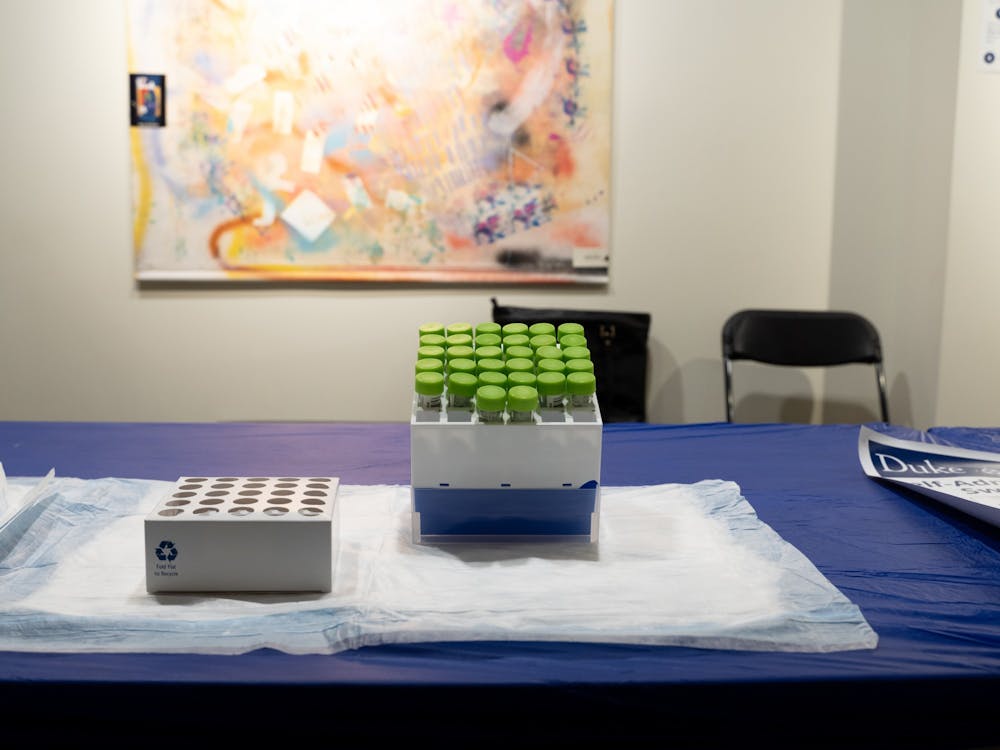In a Centers for Disease Control and Prevention report, researchers from Duke and the North Carolina Department of Health and Human Services found that the University’s COVID-19 pool testing system successfully slowed the spread of COVID-19 on campus.
The Nov. 17 Morbidity and Mortality Weekly Report discussed the University’s plan, which “allowed campus to remain open for 10 weeks of classes without substantial outbreaks among residential or off-campus populations.” It further concluded that there is no evidence from contact tracing that in-person classes caused the virus to spread.
“A combination of risk-reduction strategies and frequent surveillance testing likely contributed to a prolonged period of low transmission on campus,” the report reads. “These findings highlight the importance of combined testing and contact tracing strategies beyond symptomatic testing, in association with other preventive measures.”
The report was authored by Duke faculty and staff, as well as Zack Moore, chief of the NCDHHS’ Epidemiology Section.
Between Aug. 2 and Oct. 11, COVID-19 testing identified 84 cases among students, according to the report. Of these cases, 17 were detected by entry testing, 29 by pool testing, 23 by contact tracing and 15 by symptom monitoring. Fifty-one percent of these students were asymptomatic at the time of their positive test.
By Sept. 20, asymptomatic undergraduates in Duke housing were tested twice weekly, off-campus undergraduates once or twice a week and graduate students around once a week.
Thomas Denny, professor of medicine, chief operating officer of the Duke Human Vaccine Institute and the study’s lead author, told The Chronicle in an interview that the University hopes to keep testing at this rate when juniors and seniors return to campus next semester.
The report emphasized that 73% of positive tests were identified through asymptomatic testing and contact tracing, noting that they were “cases that might not have been detected as rapidly or completely through symptomatic testing alone.”
According to the study, Duke averaged a 0.08% positivity rate during each week between Aug. 2 and Oct. 11.
The study also noted other preventative measures, including Duke asking students to quarantine for 14 days before moving in in August, having them sign the Duke Compact, converting all dorms to singles and modifying common spaces to allow for social distancing.
Denny runs a lab in the DHVI that helped develop the procedure for pool testing. The system he helped create takes a small sample from five COVID-19 tests and runs them together. If all the samples are negative, they’re thrown away, but if the pool tests positive, the five samples are tested individually to identify the positive individuals.
“It’s extremely sensitive, so we can get down to very little copies of the virus,” Denny said. “Most of the time, we’re picking up people before they are truly symptomatic.”
Denny also explained that testing is a marker of how well members of the community are adhering to COVID-19 guidelines.
“If everyone is social distancing and wearing masks all the time, and everything is 100%, then you’d see very little infections, but the surveillance system helps you to monitor how well people are doing those types of behavior patterns,” he said.
The report notes that 95% of students appeared for testing on the day they were asked to, a figure that Denny said impressed him.
“It’s very easy sometimes to say, ‘Enough of this already, I want to have some fun,’” he said. “People get fatigued from all the needs of social distancing. So to me, the students deserve a lot of accolades for helping us get through the semester.”
He added that he is “cautiously optimistic” about the spring semester and that “we’re not letting our guard down.”
Kyle Cavanaugh, vice president for administration and an author of the report, echoed Denny’s sentiments in an email, recognizing “the entire Duke Community, actively engaged over the past several months, in practicing safe behaviors, from wearing masks to socially distancing.”
“It has been the collective commitment from everyone that has allowed our community to safely navigate this time as well as anyone in the nation,” Cavanaugh wrote. He said in a Wednesday news release that students have been “nothing short of phenomenal” in their handling of COVID-19 regulations.
Get The Chronicle straight to your inbox
Signup for our weekly newsletter. Cancel at any time.

Leah Boyd is a Pratt senior and a social chair of The Chronicle's 118th volume. She was previously editor-in-chief for Volume 117.

